Monday, Memorial Day, May 26, 2025. Annette’s Roundup for Democracy.
Extra Edition
As seen, top article, front page, digital New York Times, Sunday, May 25, 2025. 👇

The front page article leads to this. 👇
The Print Sunday paper - all 3 editions (New York, National, International) omit any mention of Trump corruption. 👇
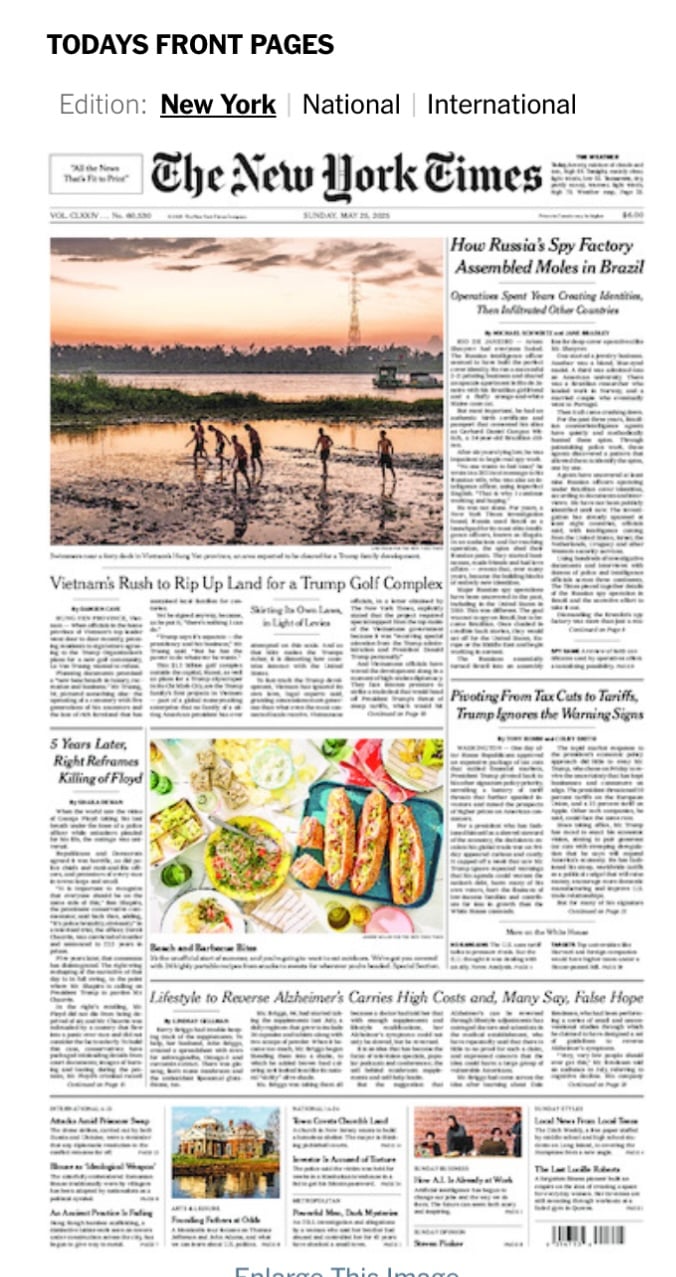
The Peter Baker article.
As Trumps Monetize Presidency, Profits Outstrip Protests.
The president and his family have monetized the White House more than any other occupant, normalizing activities that once would have provoked heavy blowback and official investigations.

President Trump at a business round-table meeting in Abu Dhabi this month.Credit...Doug Mills/The New York Times.
When Hillary Clinton was first lady, a furor erupted over reports that she had once made $100,000 from a $1,000 investment in cattle futures. Even though it had happened a dozen years before her husband became president, it became a scandal that lasted weeks and forced the White House to initiate a review.
Thirty-one years later, after dinner at Mar-a-Lago, Jeff Bezos agreed to finance a promotional film about Melania Trump that will reportedly put $28 million directly in her pocket — 280 times the Clinton lucre and in this case from a person with a vested interest in policies set by her husband’s government. Scandal? Furor? Washington moved on while barely taking notice.
The Trumps are hardly the first presidential family to profit from their time in power, but they have done more to monetize the presidency than anyone who has ever occupied the White House. The scale and the scope of the presidential mercantilism has been breathtaking. The Trump family and its business partners have collected $320 million in fees from a new cryptocurrency, brokered overseas real estate deals worth billions of dollars and is opening an exclusive club in Washington called the Executive Branch charging $500,000 apiece to join, all in the past few months alone.
Just last week, Qatar handed over a luxury jet meant for Mr. Trump’s use not just in his official capacity but also for his presidential library after he leaves office. Experts have valued plane, formally donated to the Air Force, at $200 million, more than all of the foreign gifts bestowed on all previous American presidents combined.
And Mr. Trump hosted an exclusive dinner at his Virginia club for 220 investors in the $TRUMP cryptocurrency that he started days before taking office in January. Access was openly sold based on how much money they chipped in — not to a campaign account but to a business that benefits Mr. Trump personally.

Cheng Lu, an investor in President Trump’s memecoin from Shanghai, exiting the White House after a tour on Friday. Mr. Lu attended an exclusive dinner the night before at the Trump National Golf Club outside Washington.Credit...Jason Andrew for The New York Times,
By conventional Washington standards, according to students of official graft, the still-young Trump administration is a candidate for the most brazen use of government office in American history, perhaps eclipsing even Teapot Dome, Watergate and other famous scandals.
“I’ve been watching and writing about corruption for 50 years, and my head is still spinning,” said Michael Johnston, a professor emeritus at Colgate University and author of multiple books on corruption in the United States.
Yet a mark of how much Mr. Trump has transformed Washington since his return to power is the normalization of moneymaking schemes that once would have generated endless political blowback, televised hearings, official investigations and damage control. The death of outrage in the Trump era, or at least the dearth of outrage, exemplifies how far the president has moved the lines of accepted behavior in Washington.
Mr. Trump, the first convicted felon elected president, has erased ethical boundaries and dismantled the instruments of accountability that constrained his predecessors. There will be no official investigations because Mr. Trump has made sure of it. He has fired government inspectors general and ethics watchdogs, installed partisan loyalists to run the Justice Department, F.B.I. and regulatory agencies and dominated a Republican-controlled Congress unwilling to hold hearings.
As a result, while Democrats and other critics of Mr. Trump are increasingly trying to focus attention on the president’s activities, they have had a hard time gaining any traction without the usual mechanisms of official review. And at a time when Mr. Trump provokes a major news story every day or even every hour — more tariffs on allies, more retribution against enemies, more defiance of court orders — rarely does a single action stay in the headlines long enough to shape the national conversation.
Paul Rosenzweig, who was a senior counsel to Ken Starr’s investigation of President Bill Clinton and later served in the George W. Bush administration, said the lack of uproar over Mr. Trump’s ethical norm-busting has made him wonder whether longstanding assumptions about public desire for honest government were wrong all along.
“Either the general public never cared about this,” he said, or “the public did care about it but no longer does.” He concluded that the answer is that “80 percent, the public never cared” and “20 percent, we are overwhelmed and exhausted.”
“Outrage hasn’t died,” Mr. Rosenzweig added. “It was always just a figment of elite imagination.”
The White House has defended Mr. Trump’s actions, brushing off questions about ethical considerations by saying that he was so rich that he did not need more money.
“The president is abiding by all conflict of interest laws that are applicable to the president,” said Karoline Leavitt, the White House press secretary. “The American public believes it is absurd for anyone to insinuate that this president is profiting off of the presidency. This president was incredibly successful before giving it all up to serve our country publicly.”
But saying that he is abiding by all conflict of interest laws that are applicable to the president is meaningless since, as Mr. Trump himself has long noted, conflict of interest laws are not applicable to the president.
Moreover, he has not given it all up; in fact, he is still making money from his private business interests run by his sons, and independent estimates indicate that he has hardly sacrificed financially by entering politics. Forbes estimated Mr. Trump’s net worth at $5.1 billion in March, a full $1.2 billion higher than the year before and the highest it has ever been in the magazine’s rankings.
The president’s sons scoff at the idea that they should limit their business activities, which directly benefit their father. Donald Trump Jr. has said that the family restrained itself during his father’s first term only to be criticized anyway, so it made no sense to hold back anymore. “They’re going to hit you no matter what,” he said last week at a business forum in Qatar. “So we’re just going to play the game.”

Qatar has handed over a luxury Boeing 747 jet meant for Mr. Trump’s use. Credit...Al Drago for The New York Times.
There have been some burgeoning signs of public pushback in recent days. The gift of the Qatar plane seemed to break through to the general audience in a way that other episodes have not. A Harvard/CAPS Harris poll released last week found that 62 percent of Americans thought the gift “raises ethical concerns about corruption,” and even some prominent right-wing Trump supporters like Ben Shapiro and Laura Loomer voiced objections.
Tucker Carlson, the former Fox News host who campaigned with Mr. Trump last year, expressed misgivings this week during a podcast with Shawn Ryan, a right-wing influencer, who mentioned all of the Trump family business deals that seemed to coincide with the president’s recent trip to the Middle East.
“That stuff kind of worries me,” Mr. Ryan said.
“Well, it seems like corruption, yeah,” Mr. Carlson agreed.
But while several dozen demonstrators protested outside Mr. Trump’s golf club the other night, Democrats are split about how much to focus on Trump’s profitmaking, with some preferring to concentrate on economic issues. Senator Christopher S. Murphy, Democrat of Connecticut, has been leading the charge the other direction, making floor speeches and leading news conference denouncing what he calls “brazen corruption.”
“It is unlikely he is going to be held accountable through traditional means,” Mr. Murphy said in an interview. “There are going to be no special counsels; there’s going to be no D.O.J. action. And so it’s really just about public mobilization and politics. If Republicans keep paying a price for the corruption by losing special elections throughout the next year, maybe that causes them to rethink their complicity.”
Mr. Trump had long promised to “drain the swamp” in Washington after years of corruption by other politicians. When he first ran for president in 2016, he excoriated the Clintons for taking money from Saudi Arabia and other Middle East monarchies with an obvious interest in currying favor in case Hillary Clinton won the presidency. But that money went to the Clinton Foundation for philanthropic purposes. The money Mr. Trump’s family is now bringing in from the Middle East is going into their personal accounts through a variety of ventures that The New York Times has documented.
Mr. Johnston, the corruption scholar, said the Trumps represent “an absolute outlier case, not just in monetary terms” but also “in terms of their brazen disregard” for past standards. “While we might disagree as to the merits of policy, the president and figures in the executive branch are expected to serve the public good, not themselves,” he said.
Mr. Trump made a nod at those standards in his first term by saying he would restrict his family business from doing deals overseas.
But since then, he has been convicted of 34 felony counts for falsifying business records and held liable in civil court for fraud while the Supreme Court has conferred immunity on him for official acts. In his second term, Mr. Trump has dispensed with self-imposed ethical limits.
“He’s not trying to give the appearance that he’s doing the right thing anymore,” said Fred Wertheimer, founder of Democracy 21 and a longtime advocate for government ethics. “There’s nothing in the history of America that approaches the use of the presidency for massive personal gain. Nothing.”
Congressional Republicans spent years investigating Hunter Biden, the son of President Joseph R. Biden Jr., for trading on his family name to make millions of dollars, even labeling the clan the “Biden Crime Family.” But while Hunter Biden’s cash flow was a tiny fraction of that of Donald Trump Jr., Eric Trump and Jared Kushner, Republicans have shown no appetite for looking into the current presidential family’s finances.
“The American public has had to inure itself to the corruption of Donald Trump and his presidency because the president and his Republican Party have given the American public no choice in the matter,” said J. Michael Luttig, a conservative former appeals court judge who has become a critic of Mr. Trump.
Mr. Trump evinces no concern that people funneling money into his family coffers have interests in government policies. Some of the crypto investors who attended his dinner on Thursday night acknowledged that they were using the opportunity to press him on regulation of the industry. According to a video obtained by The Times, he reciprocated by promising guests that he would not be as hard on them as the Biden administration was.
One guest at the Trump National Golf Club in Sterling, Va., that night was Justin Sun, a Chinese billionaire who became one of the largest holders of the $TRUMP memecoin after buying more than $40 million, earning him a spot in an even more exclusive private VIP reception with the president before the dinner. The Securities and Exchange Commission in 2023 accused Mr. Sun of fraud, but after Mr. Trump took over the agency put its lawsuit on hold even as it dropped other crypto investigations.
As for Mr. Bezos and Qatar, each has reason to get on Mr. Trump’s good side. In his first term, Mr. Trump, peeved at coverage in The Washington Post, which is owned by Mr. Bezos, repeatedly pushed aides to punish his main firm, Amazon, by drastically increasing its U.S. Postal Service shipping rates and denying it a multibillion-dollar Pentagon contract. Mr. Trump denounced Qatar as a “funder of terrorism” and isolated it diplomatically. He has not targeted either Mr. Bezos or Qatar in his second term.

The president has not hesitated either to install allies with conflict issues in positions of power. He tapped a close associate of Elon Musk as the administrator of NASA, which provides Mr. Musk’s SpaceX with billions of dollars in contracts. Attorney General Pam Bondi, who previously worked as a lobbyist for Qatar, signed off on the legality of Qatar’s airplane gift.
In this handout photo, Chase Herro and Zach Witkoff, co-founders of World Liberty Financial, and Donald Trump Jr., at a crypto event in Washington in March.Credit...The Digital Chamber, via Reuters
Zach Witkoff, a founder of the Trump family crypto firm World Liberty Financial, and son of Steve Witkoff, the president’s special envoy, announced a $2 billion deal in the United Arab Emirates, just a couple of weeks before his father and Mr. Trump traveled there for a presidential visit.
Mr. Wertheimer said the accumulation of so many conflicts puts Mr. Trump on the all-time list of presidential graft. “He’s got the first 10 places on that,” he said. “He’s in the hall of fame of ripping off the presidency for personal gain.” But he said the public would eventually grow upset. “I think that’s going to catch up with him. It’s going to take some time, but it’s going to catch up with him.” (New York Times).
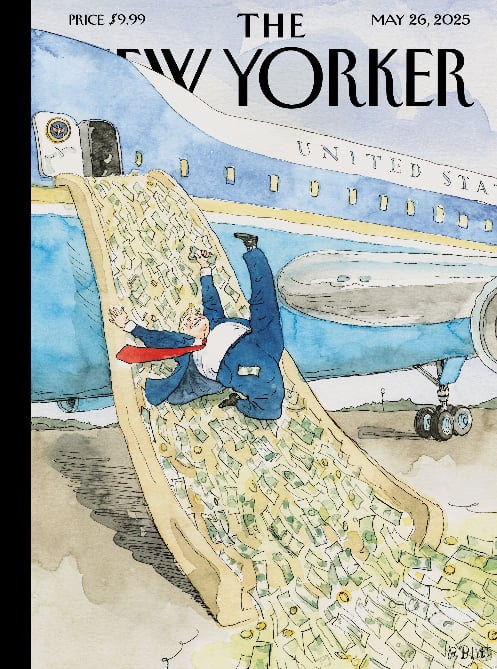
The next planned protest doesn’t seem to be until June 14.
In honor too of Trump’s planned military parade and the sad day he was born.
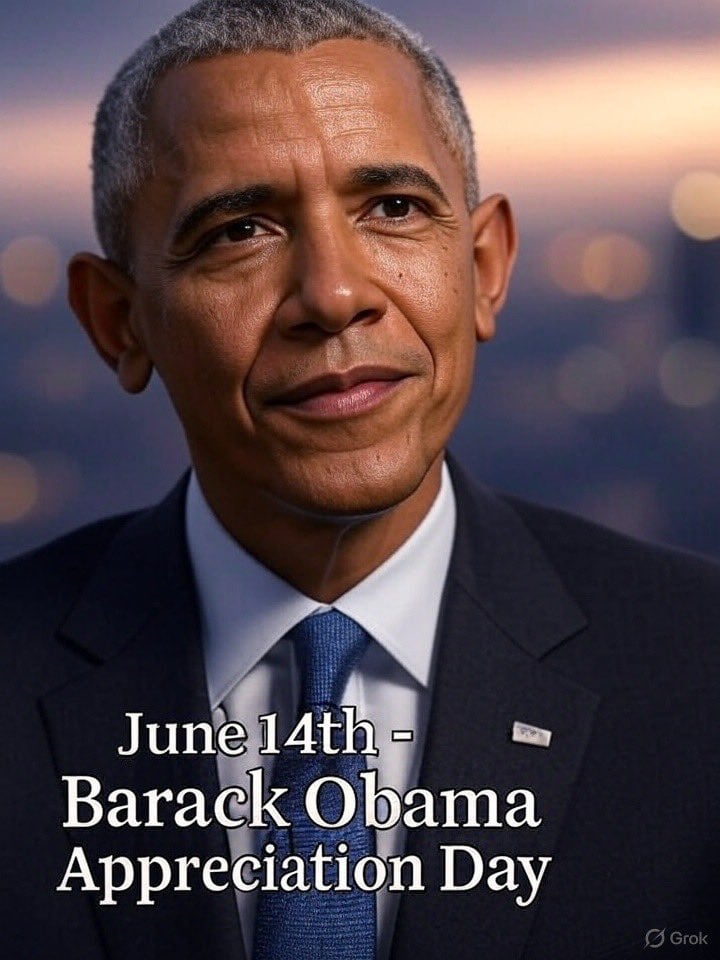
Bonus. More on Trump’s attack on education.
Heather Cox Richardson on the history of Republican anti-intellectualism and determination to remake our universities.
Letters from an American. Heather Cox Richardson. May 24, 2025.
On Thursday the Trump administration told Harvard University that because it had not handed over information on foreign students’ protest activities, violent activity, and coursework, the university had “lost [the] privilege” of enrolling foreign students. Secretary of Homeland Security Kristi Noem said this decision was based on the administration’s determination to “enforce the law and root out the evils of anti-Americanism and antisemitism in society and campuses.”
This argument has always been a thinly veiled way to use actual antisemitism to destroy universities, a reality illustrated by Trump’s hosting last night of cryptocurrency investors whose coins are literally named things like “F*CK THE JEWS.”
Harvard promptly sued, noting that the administration has engaged in an “unprecedented and retaliatory attack on academic freedom at Harvard” and calling the attack “a blatant violation of the First Amendment, the Due Process Clause, and the Administrative Procedure Act.” “With the stroke of a pen,” the lawsuit reads, “the government has sought to erase a quarter of Harvard’s student body, international students who contribute significantly to the University and its mission.”
Hours later, Judge Allison Burroughs of the U.S. District Court for the District of Massachusetts granted Harvard’s request for a temporary restraining order barring the administration’s change from taking effect. She wrote that the new policy would cause “immediate and irreparable injury” to Harvard.
While President Donald J. Trump might well have his own reasons for hating a university famous for its brain power, the anti-intellectual impulse behind Trump’s attacks on higher education has a long history in the United States.
That history reaches at least as far back as the 1740s, when European-American settlers in the western districts of the colonies complained that men in the eastern districts, who monopolized wealth and political power, were ignoring the needs of westerners. This opposition often took the form of a religious revolt as westerners turned against the carefully reasoned sermons of the deeply educated and politically powerful ministers in the East and followed preachers who claimed their lack of formal education enabled them to speak directly from God’s inspiration.
One hundred years ago tomorrow, that cultural impulse surfaced in a national spectacle that would feed directly into today’s attacks on education.
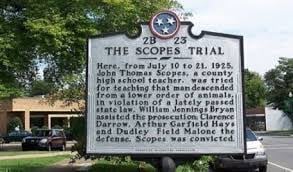
On May 25, 1925, a grand jury in Tennessee indicted 24-year-old football coach and science teacher John T. Scopes for violating Tennessee’s law, passed in March of that year, that made it “unlawful…to teach any theory that denies the story of the Divine Creation of man as taught in the Bible, and to teach instead that man has descended from a lower order of animals.” In other words, Tennessee had banned the teaching of human evolution.
The law, known as the Butler Act, was sponsored by John Washington Butler, a farmer and head of the new World Christian Fundamentals Association, which sought to establish the word of God as revealed in the Bible at the heart of American life. Butler later said he didn’t know anything about evolution but had heard “that boys and girls were coming home from school and telling their fathers and mothers that the Bible was all nonsense.” Tennessee governor Austin Peay signed the law to please rural Tennesseans and their representatives, but he allegedly did not think the law would ever be enforced.
The American Civil Liberties Union recruited Scopes to test the law just as a local man from Dayton, Tennessee, thought a trial there would give the town welcome publicity. The resulting Scopes trial became a national referendum on modernism and education versus a fundamentalist religious urge to move the country backward. Scopes ultimately was found guilty, but the trial showed religious fundamentalists as incompatible with the modern world.
While some fundamentalists backed away from the public sphere after the trial, others began to try to transform American business, just as Bruce Barton suggested could be done in his 1925 bestseller The Man Nobody Knows, which showed Jesus as “the founder of modern business.” In his 2016 The Blessings of Business, historian Darren Grem traces how fundamentalist leaders began to work with big business, especially as Democratic president Franklin Delano Roosevelt challenged traditional racial and gender lines.
The New Deal seemed to undermine the influence of the church by providing federal welfare policies. The Church League of America made common cause with the businessmen who opposed the business regulation in the New Deal, arguing that Christianity “elevates and dignifies human personality in contrast to the so-called ‘Collectivist’ or Marxian doctrines.” “Free Religion–Free Enterprise are Inseparable,” it said, “One Cannot Exist Without the Other.”
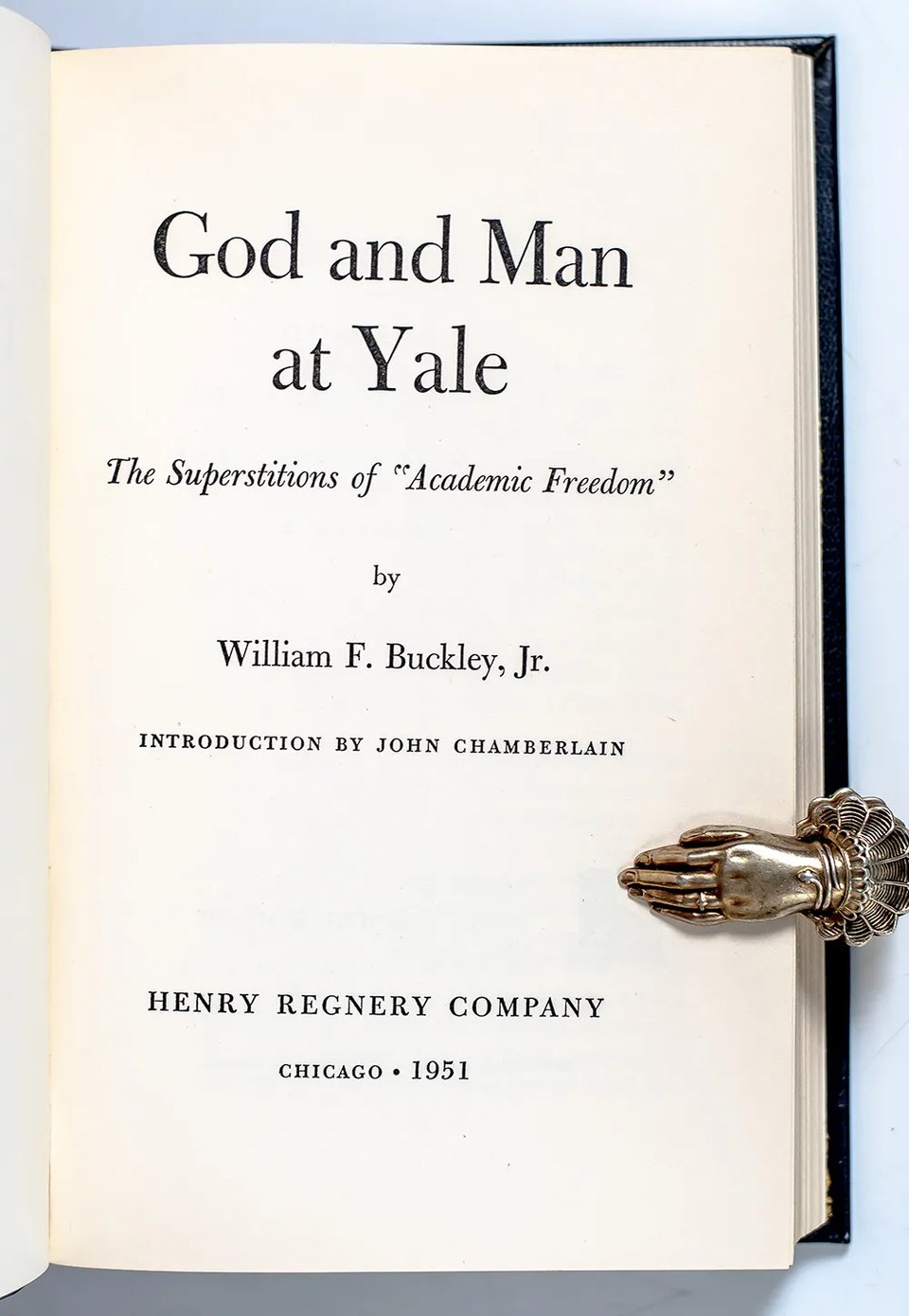
William F. Buckley Jr. applied this line of thinking to higher education in his 1951 God and Man at Yale: The Superstitions of Academic Freedom. In it, Buckley argued that Yale University was corrupted by “atheism” and “collectivism” not because its faculty actually called for atheism and collectivism, but because their embrace of fact-based argument supported the government that had grown out of the New Deal.
Modern universities embraced the Enlightenment tradition of a free search for knowledge in the belief that informed discussion fed by a wide range of ideas was the best way to reach toward truth. As ideas were tested in public debate, people would be able to choose the best of them. This was the basis of academic freedom.
Buckley denied this “superstition.” Truth would not win out in a free contest of ideas, he said; students would simply be led astray. For proof, he offered the fact that most Americans had chosen the New Deal and continued to support its extension. He called for Yale to replace faculty that believed in academic freedom with those who would advance the causes of Christianity and free enterprise.
Government analyst McGeorge Bundy called the book “dishonest in its use of facts, false in its theory, and a discredit to its author.” He recognized it as “clearly an attempt to start an assault on the freedom of one of America’s greatest and most conservative universities.”
America’s post–World War II university system was the envy of the world, driving innovation and medical and scientific research that made the U.S. economy boom and raised standards of living around the world. But the idea that the modern government imposed the will of what Ronald Reagan called “a little intellectual elite in a far-distant capital” on the laws of God and the natural laws of the United States was a powerful tool to undermine the modern government.
In a 1971 memorandum for the U.S. Chamber of Commerce, lawyer Lewis F. Powell Jr. wrote that “the American economic system,” which he defined as the “free enterprise system,” “capitalism,” and “the profit system,” “is under broad attack.”
Powell identified college campuses as the center of this attack and called for setting up right-wing think tanks and speakers’ series to advance the interests of business, restoring what he called “balance” to textbooks, and for pressure on colleges to appoint right-wing faculty members, all in the name of “strengthening of both academic freedom on the campus and of the values which have made America the most productive of all societies.”
As Republicans embraced economic individualism and religion, they also embraced anti-intellectualism. Their version was not unlike that of the early colonists, in which rural Americans, especially those in the West, claimed their evangelical religion made them more worthy than the urban Americans in the East who far outnumbered them. When Republican presidential candidate John McCain tapped evangelical Alaska governor Sarah Palin to be his running mate in 2008, he acknowledged the growing power of that demographic.
Increasingly, far-right activists insisted that all of the pillars of society, including universities, had been corrupted by the liberal ideas behind the modern government and that those pillars must be destroyed. In 2012, college dropout Charlie Kirk and Tea Party activist Bill Montgomery formed Turning Point USA to purge college campuses of those faculty members they saw as purveyors of dangerous ideas. After Trump’s election in 2016, the organization launched the “Professor Watchlist,” which listed faculty members it claimed—without evidence—“discriminate against conservative students, promote anti-American values and advance leftist propaganda in the classroom.” (I was one of the first on the list.)
That impulse to purge society of the institutions that support modern liberal government became a full-throated attack on universities.
In a 2021 interview, then Senate candidate J.D. Vance said that the American right has “lost every major powerful institution in the country, except for maybe churches and religious institutions, which of course are weaker now than they’ve ever been. We’ve lost big business. We’ve lost finance. We’ve lost the culture. We’ve lost the academy. And if we’re going to actually really effect real change in the country, it will require us completely replacing the existing ruling class with another ruling class…. I don’t think there’s sort of a compromise that we’re going to come with the people who currently actually control the country. Unless we overthrow them in some way, we’re going to keep losing.” “We really need to be really ruthless when it comes to the exercise of power,” he said.
The same year, Vance told the National Conservatism Conference that “we have to honestly and aggressively attack the universities in this country.” “We live in a world that has been made effectively by university knowledge” and to rebuild the nation along the lines of white Christian nationalism, the universities must be destroyed. Vance told the audience, “the professors are the enemy.”
On July 1, 2024, the Supreme Court decided that an American president could not be prosecuted for crimes committed as part of his official duties, and the next day, Heritage Foundation president Kevin Roberts, the key organizer of Project 2025, went on Steve Bannon’s podcast War Room to tell supporters that America’s radical white Christian nationalists were “going to win. We’re in the process of taking this country back.” He said the country needed a strong leader because “the radical left…has taken over our institutions.”
And now the Trump administration is dismantling higher education. As Harvard said in its lawsuit: “There is no lawful justification for the government’s unprecedented revocation of Harvard’s [certification for accepting foreign students], and the government has not offered any.”
“[W]e are in the process of the second American Revolution,” Roberts said last July, “which will remain bloodless if the left allows it to be.” (Substack, photos and video are my additions).
One more thing. Or two. Or 21 plus 1.
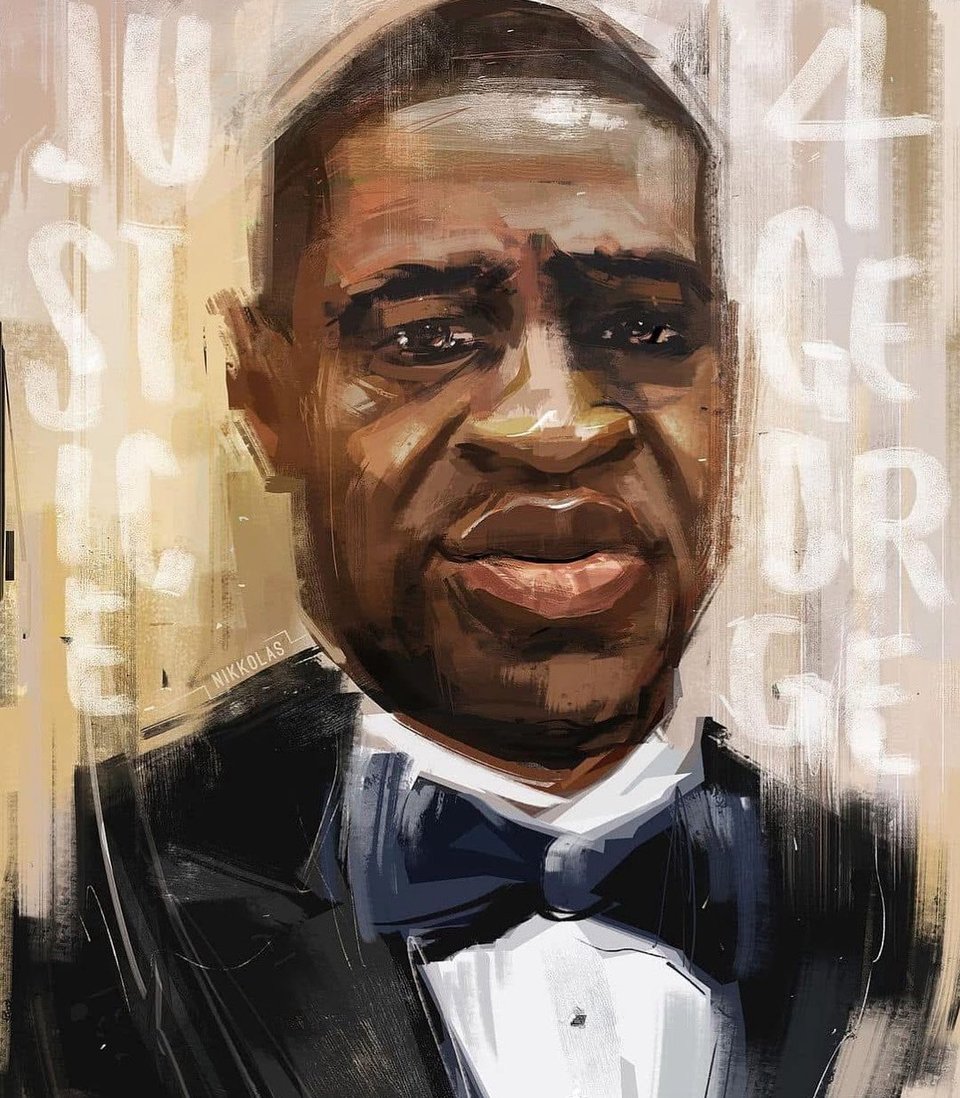
George Floyd, May 25, 2020.

Uvalde, May 24, 2022.
Or thousands.
